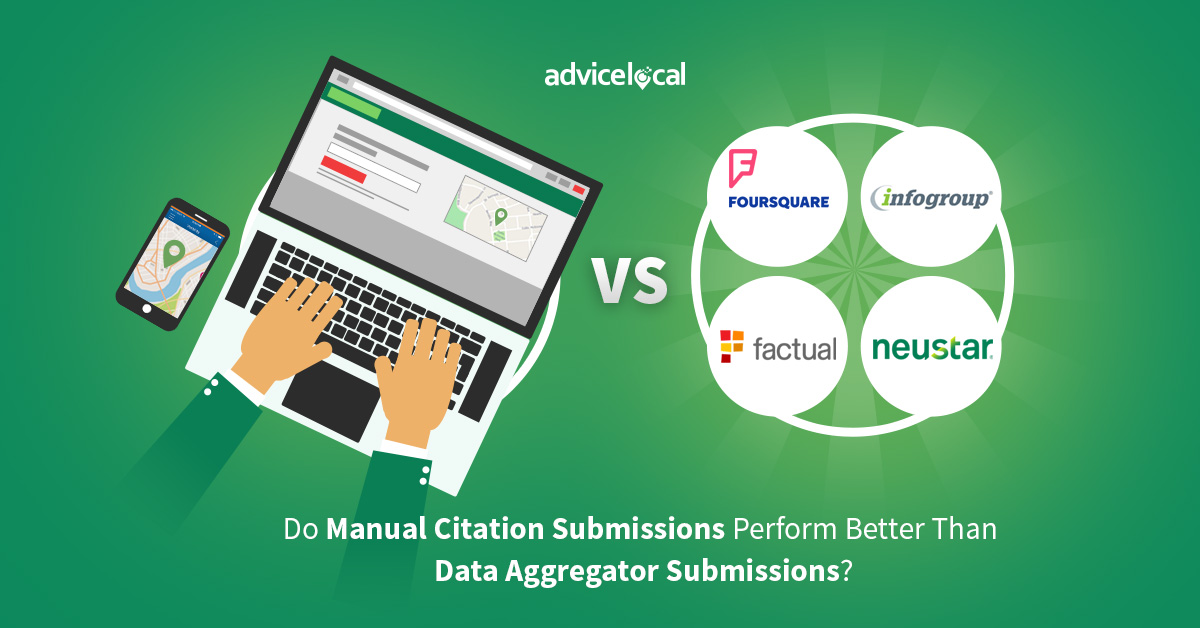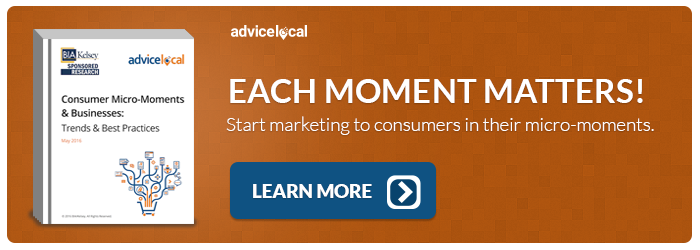To get found online, small and large businesses alike need to create and claim online listings (also referred to as local citations). It’s a surefire way to attract customers online and present accurate data to search engines. Plus, businesses can ensure that their online data, like their name, address and phone number (NAP), is accurate. However, creating all of a business’ listings, from Google Business Profile (formerly Google My Business) to Bing and everything in between, can be challenging. This is exactly why, at Advice Local, we put the work in for our partners that are representing local businesses.
Differences Between Data Aggregators and Manual Citation Submissions
When companies rely on manual citation submissions, they must directly input information onto other sites by hand. This is a very time-consuming task; most sites require multiple verification steps.
Data aggregators – sometimes referred to as local data aggregators – make things a bit simpler. The use of data aggregators helps a local business spread their NAP to a multitude of sources with minimal effort. Simply put, data aggregator submissions take care of verification steps and spread information much faster than doing it manually.
Of course, not everything is data aggregators. While they do get a good chunk of the job done, it’s important for local businesses to submit to other directories, like Google Business Profile, Bing Places, Yelp and other directories accessible via our Data Amplifier Network.
So, which is the better option: manually submitting citations or submitting to the top four data aggregators to reach multiple sources? Keep reading to learn the pros and cons of both methods, as well as our recommendation to achieve the most success with online directories.
The Manual Citation Submission Process
It is possible for a manual citation building service to address all of the necessary directories and listing sites. Assuming that it takes 10 minutes to complete each submission (on average), and a big chain with multiple locations could require 300 submissions, you could easily be looking at two weeks worth of work just submitting to the top directories.
Since it’s completely free to submit citations manually to most sources, some businesses choose to do this to save money. However, depending on how many submissions are necessary and if the business has the manpower and time to spend on the task, the sheer workload can overrule the monetary savings.
While manually submitting can give a business more control over their listings, their listings can still get overridden by other data sources quite easily. This is one way bad data can happen.
The Data Aggregator Submission Process
There are four main data aggregators in the United States, and each one is somewhat simple to submit to for a business with a single location. It can become time-intensive for multi-location businesses, however, unless the business has a team working solely on submissions for them.
Data aggregators in the United States are powerful and one of the most important ways to ensure a local business gets found online. Submitting a local business’ NAP to these sources allows the information to be shared with multiple sources – and the right kind of sources.
Submitting to data aggregators can improve consumers’ trust in a local business. Did you know that 80 percent of consumers lose trust in local businesses if they see inconsistent or incorrect details online? When businesses submit correct NAP information to data aggregators, they can reduce the number of inaccurate citations around the internet.
Each data aggregator is different, but they are all important:
- Factual has a presence in over 50 countries and their publishers include The Weather Channel, Yelp, Apple, Bing, Facebook and Uber.
- Infogroup licenses data to clients in the search, navigation and mobile industries, which makes up approximately 95 percent of search traffic.
- Neustar Localeze distributes data to over 90 search platforms, directories, navigation services, mobile apps and social sites.
- Foursquare has 55M+ users making it a leading location-based social network. With 70M+ recommendations & over 7B check-ins to local businesses.
Can I Hire Someone to Do Business Listing Submissions?
As we’ve said before, not all directories are created equal. Still, it’s vital that local businesses submit their data to all of them, not just a few. That’s where third parties (like Advice Local!) come in.
There are many listing management services that send a business’ information through an expansive network of directories and data aggregators, ensuring that the company has the most accurate online presence possible (for example, review our Data Amplifier Network, which includes the top data aggregators, local pages like Google, Bing and Yelp, plus GPS and mapping apps like Garmin, Apple and Waze).
We have a data aggregator scan tool that allow businesses to see which top aggregators have their information. This helps business owners to build a more comprehensive view of their online presence (and where it is weakest).
The prices for manual citation submission services can vary, depending on how the service charges – by month, year or individual site. Most of the time, the service will create a directory listing for a fairly low price – but do they maintain it? This is one of many questions you should ask when selecting a local listing management provider.
With the time associated with submitting a business’ information to all the best data sources, hiring a third-party company is not only cost effective, but also smart. Yes, we’re partial, but we wouldn’t lead you the wrong way, either.
Can I Choose Specific Directories for Business Listings With Aggregator Submissions?
One thing about manually submitting to online directories is that you can choose which sites receive the business’ information. Businesses can decide how many directories they want to submit to and which they think are the most important. However, since many other directories and data sources receive submissions from other sources or scrape the web, the business could still end up listed on a directory that it didn’t want to be on – just something to consider when taking the manual approach for the sake of having more control.
With data aggregator submissions, businesses lose some of that control, but they gain so much. The information submitted to the four USA aggregators will be sent out to a network of sites which can correct bad data previously published about the business on the web.
The Impact of Duplicate Citations
You might think “the more citations, the merrier,” right? Wrong. More citations may translate to duplicate citations. Duplicate citations are bad for businesses of all kinds, especially when one (or both) of the citations include inaccurate information. According to BrightLocal, roughly 78 percent of consumers say they’d stop using a local business if they found incorrect information in online directories. Furthermore, Google sees duplicates as spam, and the business’ online ranking may suffer.
That’s another benefit of hiring a third party to handle submissions – some services will clean up incorrect information scattered around the internet. The business’ ranking and visibility will benefit as a result. It’s imperative to understand how the listing management partner you choose handles the citation cleanup process.
How Can a Business Decide Which Submission Is Right?
Deciding how to submit to local business directories can be a complicated decision for a small business owner. Start with the most important sources first, such as Google Business Profile, Bing and Yelp. Then, as the budget increases, expand out by using a service.
Since data aggregator submissions tackle a large range of sites, going there next is a good step.
At Advice Local, we take a hybrid approach to submissions. We submit to data aggregators and other important directories and data sources via API while manually submitting to other sources. This ensures that your local business clients are found online in the best directories.
To find out why partners choose us, request a demo today!




